Corporations and LLCs on the Multistate Essay Exam: Highly Tested Topics and Tips
 Corporations and LLCs on the Multistate Essay Exam: Highly Tested Topics and Tips
Corporations and LLCs on the Multistate Essay Exam: Highly Tested Topics and Tips
Corporations and LLCs is regularly tested on the MEE. The examiners often test the same issues, so it is worth knowing what these highly tested Corporations and LLCs issues are.
Corporations and LLCs on the Multistate Essay Exam
1. First, know how Corporations and LLCs is tested
Corporations and LLCs is tested, on average, a little over once a year. It is often tested when Agency and Partnership is not tested (though they are sometimes tested together). On most exams, you will see Agency and Partnership, Corporations and LLCs, or both subjects.
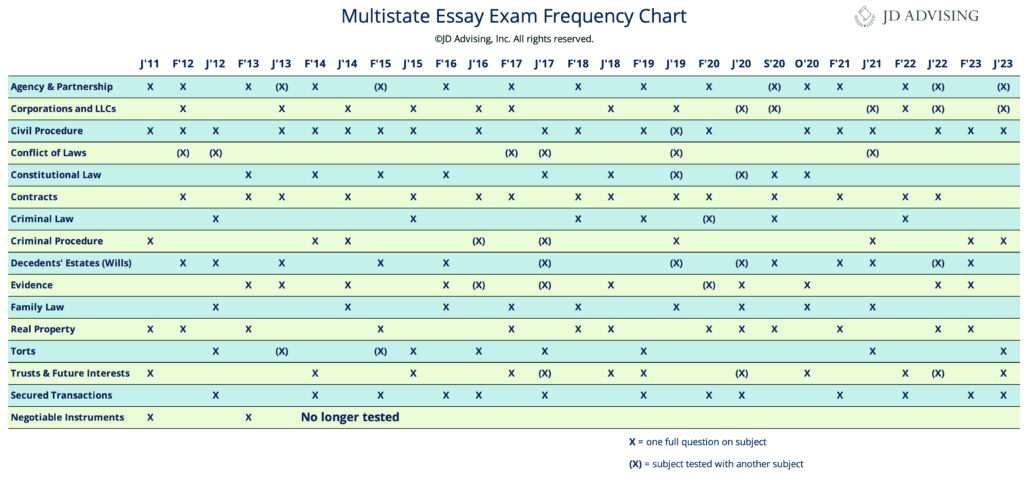
Basic principles of corporation law tend to be tested on Corporations and LLCs MEE questions. Most MEE answers refer to the Model Business Corporation Act (MBCA) or the Revised Model Business Corporation Act (RMBCA).
2. Be aware of the highly tested Corporations and LLCs issues
The examiners tend to test several of the same issues repeatedly in Corporations and LLCs questions. (We have a nice summary of these in our MEE One-Sheets if you want to see all of them and have them all in one place.)
Some of the highly tested Corporations and LLCs MEE issues include:
Fiduciary duties
These duties are tested both in questions that test Corporations and questions that test LLCs.
- The duty of care: In the context of Corporations and LLCS, the duty of care creates a presumption that in making a business decision, the directors acted on an informed basis, in good faith and in the honest belief that the action taken was in the best interest of the company. This is the business-judgment rule. Directors must be informed to an extent that they reasonably believe is appropriate. They are entitled to rely on information, opinions, reports, or statements of corporate officers, legal counsel, public accountants, etc., in making decisions.
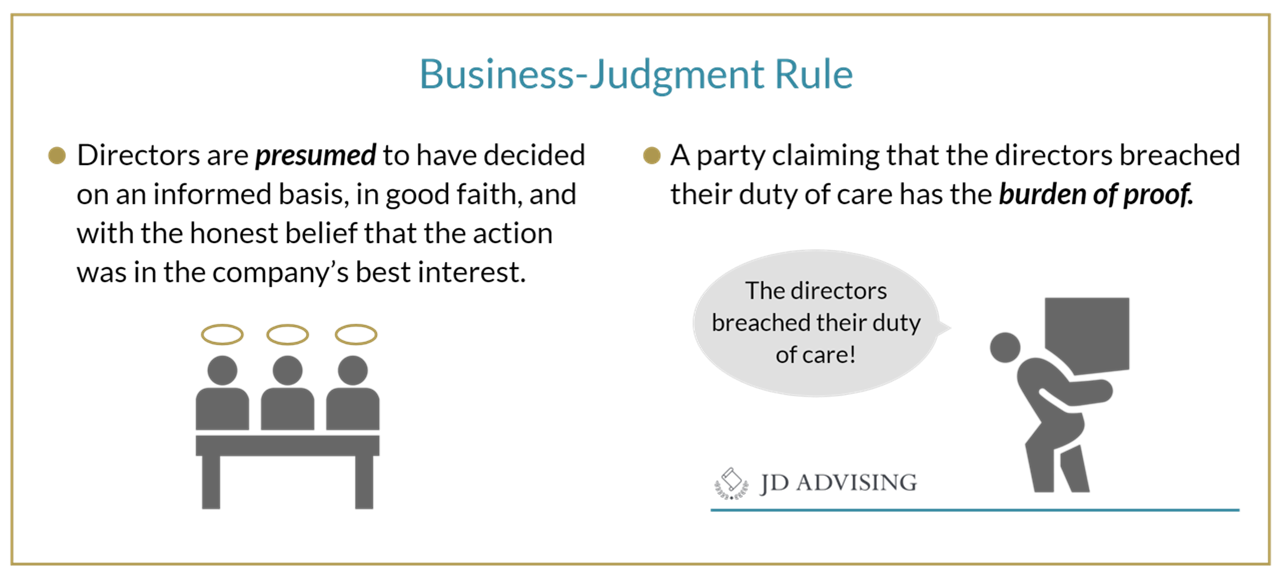
- The duty of loyalty: The most common issue when a duty of loyalty problem arises is that a director is on both sides of a transaction. Oftentimes, the duty of loyalty is tested in combination with a duty of care issue. For example, a director is on the board of ABC, Inc. The director also owns XYZ, Inc. The director convinces the board that ABC should enter into a contract with XYZ. The ABC board talks it over for 10 minutes, even though it is a major and expensive contract, and all board members, including the interested director, vote to approve the contract. The director has likely breached his duty of loyalty (unless he can show it was a fair contract) since the director is on “both sides” of the deal—he is voting on ABC’s board, and he owns XYZ. Further, the board likely breached their duty of care if they only talked it over for 10 minutes.

Shareholder lawsuits
There are two types of shareholder lawsuits that are heavily tested:
- Direct suits: A direct suit is appropriate when the wrong done amounts to a breach of duty owed to the shareholder personally. In a direct suit, the shareholder is not bringing a suit on behalf of the corporation. Instead, they are bringing the suit on behalf of themselves! Examples of when a direct suit is appropriate are when a shareholder is denied preemptive rights, is denied payment of a dividend, or is bringing a suit for oppression in a close corporation. The key is that these claims are all personal to the shareholder.
- Derivative suits: A derivative suit is appropriate when the injury is caused to the corporation and the shareholder is trying to enforce the corporation’s rights. The shareholder can do this because the shareholder is an owner of the corporation, so the shareholder has standing to bring such a suit to enforce the corporation’s rights. Filing a derivative suit has the following requirements (mnemonic = SAD): (1) the shareholder needs standing to bring a lawsuit (it owns stock in the corporation), (2) adequacy (the shareholder represents the interests of the corporation), and (3) demand (generally, the shareholder should file a written demand and wait 90 days before filing a suit unless irreparable injury would result or a demand would be futile). An example of when a derivative suit is appropriate is if the board is making a decision that hurts the corporation. Derivative suits are tested more frequently on the MEE than direct suits.
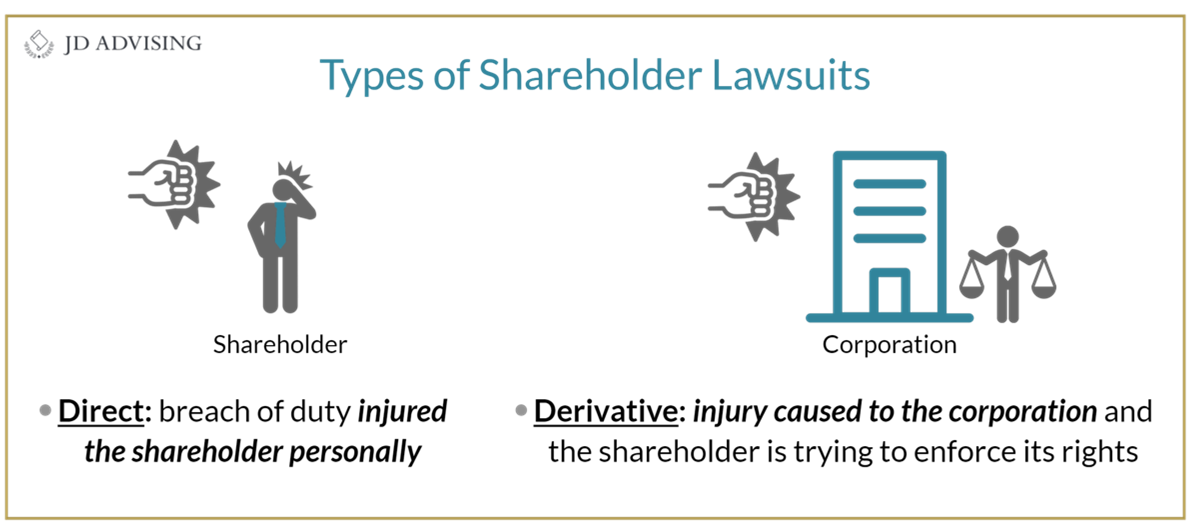
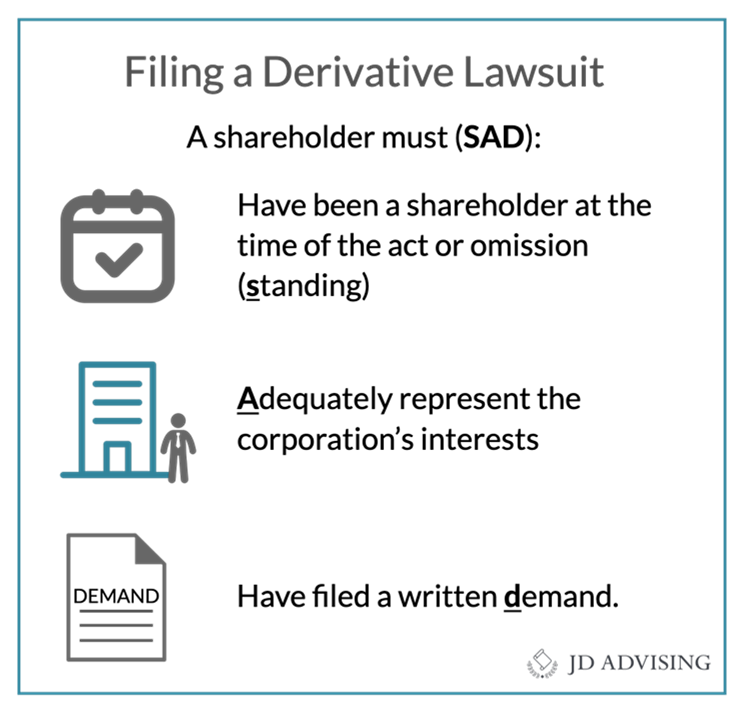
LLCs
Remember that LLCs sometimes are tested instead of Corporations! Many of the same principles that apply to Corporations or Partnerships apply to LLCs. The most common issues in LLC questions are piercing the LLC veil and fiduciary duties.
- Piercing the LLC or corporate veil: Generally, a plaintiff must show that shareholders of the corporation or members of an LLC abused the privilege of incorporating, and fairness requires holding them liable. The plaintiff can pierce the veil if it can show undercapitalization of the business, failing to follow formalities, commingling of assets, etc.
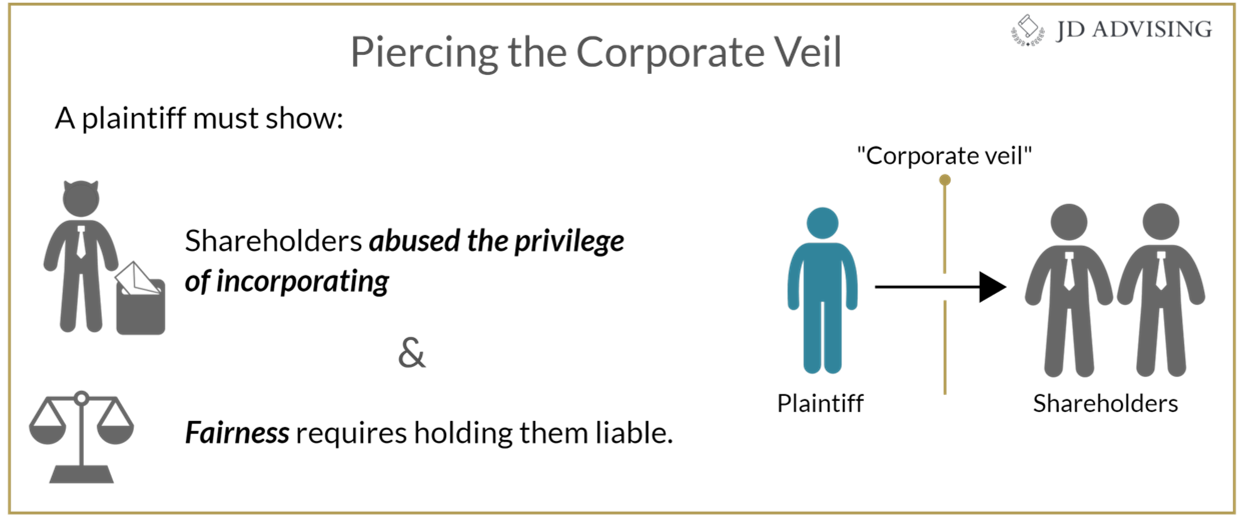
3. Be aware of Corporations and LLCs basics
Many examinees struggle with the basic principles of Corporations and LLCs. If you do not understand basic principles (like the role of directors and the role of shareholders) then you will find it very hard to memorize the law. Further, even if you are able to memorize the law, you will have a hard time applying it to fact patterns.
So, it is a good idea to get the basics down first!
Some Corporations and LLCs basics:
- Directors manage the corporation. Thus, they meet regularly. Directors must vote responsibly, so they cannot vote by proxy or voting agreement. (Their judgment should not be unfairly affected by a proxy or voting agreement!). The business-judgment rule applies, and directors are presumed to act reasonably.
- Shareholders own the corporation. Because they are merely owners, shareholders do not meet as often as directors but are entitled to annual meetings. Shareholders must receive notice for meetings. Shareholders can vote by proxy or agreement because they are not the ones managing the corporation.
- Officers are agents of the corporation. Officers are the president, secretary, treasurer, etc. They have the power to enter into transactions on behalf of the corporation. In an Agency combo MEE question, an officer likely has actual or apparent authority to enter into a contract on behalf of the corporation.
- A corporation must be incorporated (i.e., articles of incorporation must be filed with the state) in order for a valid corporation to be formed.
- LLCs must also file articles of organization with the state. Members of an LLC are similar to officers in that they may have actual or apparent authority to bind the LLC.
4. Be aware of Corporations and LLCs vocabulary
Many examinees struggle with the vocabulary used in Corporations and LLCs questions. Here, we give a layman’s version of some vocabulary terms that may help you remember them!
Layman’s version of Corporations and LLCs vocabulary
- Articles of incorporation: A fancy word for the corporation’s contract with the state. The articles include basic information like the corporation’s name, address, names of incorporators, etc. Additional provisions can be added. Because the corporation files these with the state, they are public.
- Dividend: A fancy word for the corporation’s profits. Shareholders buy a corporation’s shares to receive profits.
- Subscription: A fancy word for an offer to buy a certain number of a corporation’s shares. In general, the offer must be in a signed writing and state a price.
- Promoter: This is someone who “promotes” a corporation before it is even formed by entering into preincorporation contracts on behalf of the corporation. For example, you and I want to form a corporation to sell coffee. We send in our articles of incorporation to the state (but it takes a while to get them back) and we are eager to get started on our very lucrative business idea. Thus, I personally sign a lease with a landlord agreeing to rent space for one year. I sign my name, “John Doe, on behalf of Coffee, Inc., a corporation to be formed.” I am “promoting” the corporation by entering into leases on its behalf before it is even in existence. Thus, I am the promoter and I am liable on the lease.
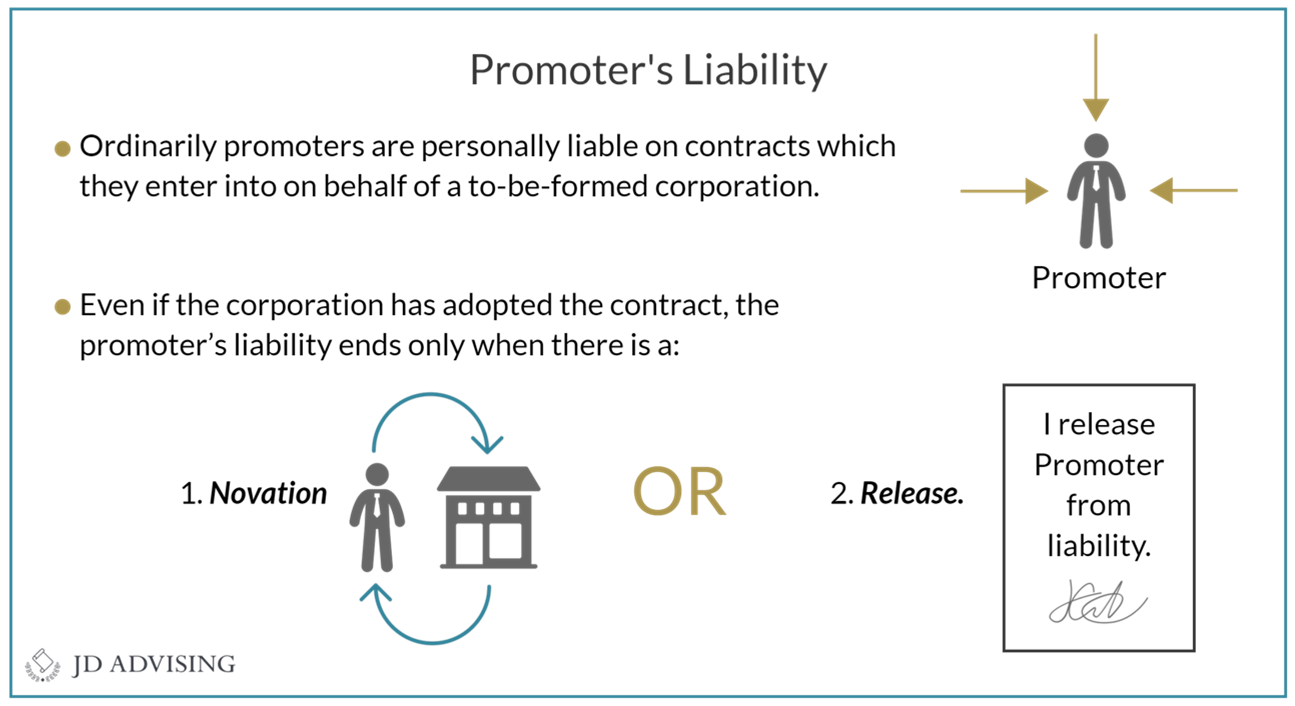
- Ratify: A fancy word for approving the acts of another—often, those of the promoter. In the above example, the corporation is liable if it ratifies or approves of the lease. The corporation could expressly ratify the lease by signing its name to it or impliedly ratify the lease (e.g., by moving in and acting as if the corporation is part of the lease agreement!).
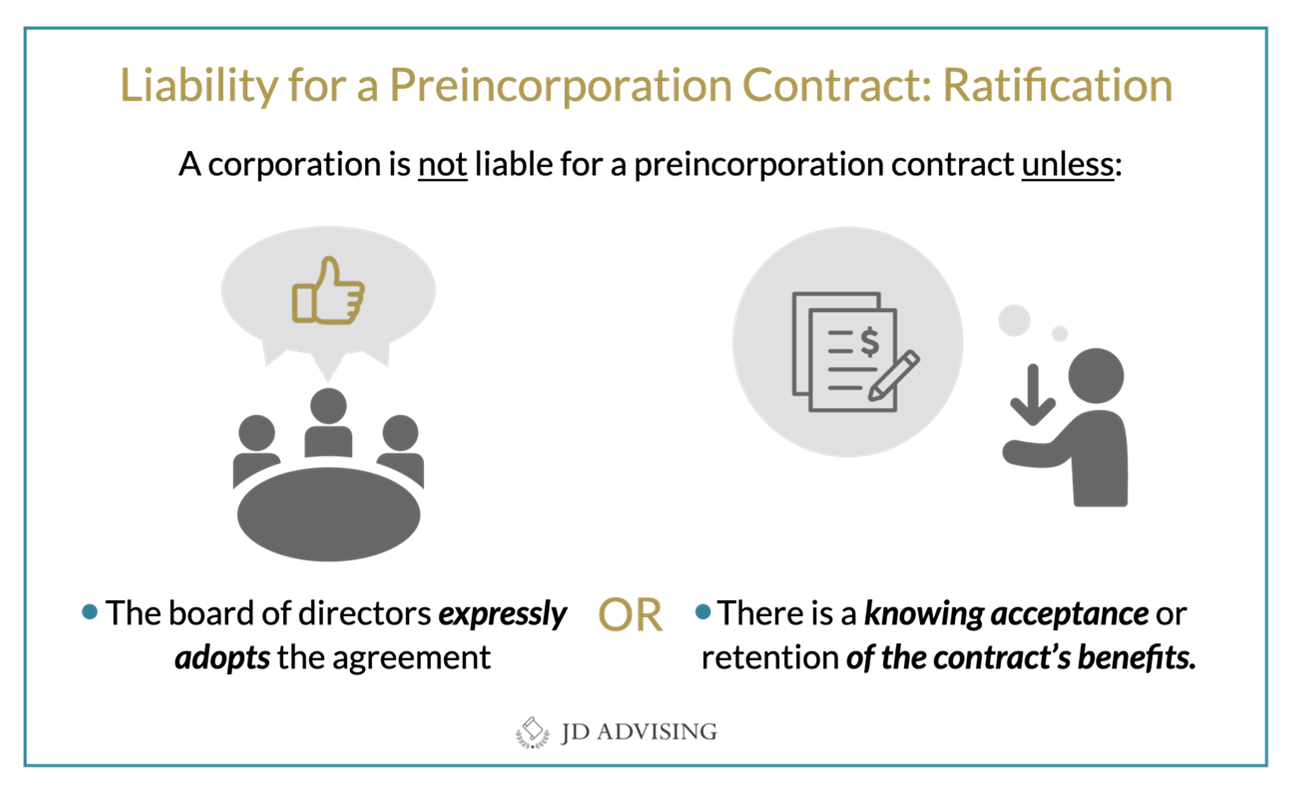
- Quorum: A fancy word for the majority of the directors or outstanding shares entitled to vote represented at the meeting in person or by proxy. (Look at the number of shares present, not the number of people present for a shareholder quorum.)
Being familiar with key vocabulary will help you gain credibility with the grader, and it will help you maximize your MEE score!
5. Practice!
The best way to excel at Corporations and LLCs on the MEE is to practice writing answers to essay questions. This will help you become acquainted with how Corporations and LLCs is tested. And it will help you master the highly tested issues.
Here, we provide you with some links to free Corporations and LLCs questions and NCBE point sheets. You also can see some exams on the NCBE website for free here.
- February 2022 Corporations and LLCs MEE: this MEE covers directors’ authority to vote on corporate decisions; duty of loyalty (interested director transaction), safe harbor; recovery from a derivative lawsuit goes to the corporation, not the shareholder; shareholder who didn’t own shares at the time of the alleged wrongful conduct does not have standing to bring a derivative suit.
- July 2016 Corporations and LLCs MEE: this MEE covers some highly tested LLCs issues.
- July 2015 Corporations and LLCs MEE: this MEE covers the duty of care, the business-judgment rule, and the duty of loyalty.
- July 2014 Corporations and LLCs: this MEE covers shareholder voting rights, bylaws, and direct versus derivative suits.
- February 2009 Corporations and LLCs MEE: this MEE covers the duty of care, the duty of loyalty, and defenses to a violation of the duty of loyalty.
Go to the next topic, Civil Procedure.
Seeking MEE Expertise?
🌟 Freebies & Discounts
- Free Bar Exam Resource Center: Explore for leading guides, articles, and webinars.
- Expert-Crafted Bar Exam Guides: Unveil insights on high-frequency MEE topics and strategies for success.
- Free Webinars: Engage with top bar exam experts.
🔥 Top-Rated MEE Resources
- MEE One-Sheets: Boost your confidence with our most popular bar exam product!
- Bar Exam Outlines: Our comprehensive and condensed bar exam outlines present key information in an organized, easy-to-digest layout.
- NEW MEE Mastery Class: Unearth focused, engaging reviews of essential MEE topics.
- Bar Exam Crash Course and Mini Outlines: Opt for a swift, comprehensive refresher.
- MEE Private Tutoring and feedback: Elevate your approach with tailored success strategies.
- MEE Course: Preview our acclaimed five-star program for unmatched instruction, outlines, and questions.
🔥 NEW! Dive deep into our Repeat Taker Bar Exam Course and discover our unrivaled Platinum Guarantee Pass Program.





Leave a Reply
Want to join the discussion?Feel free to contribute!